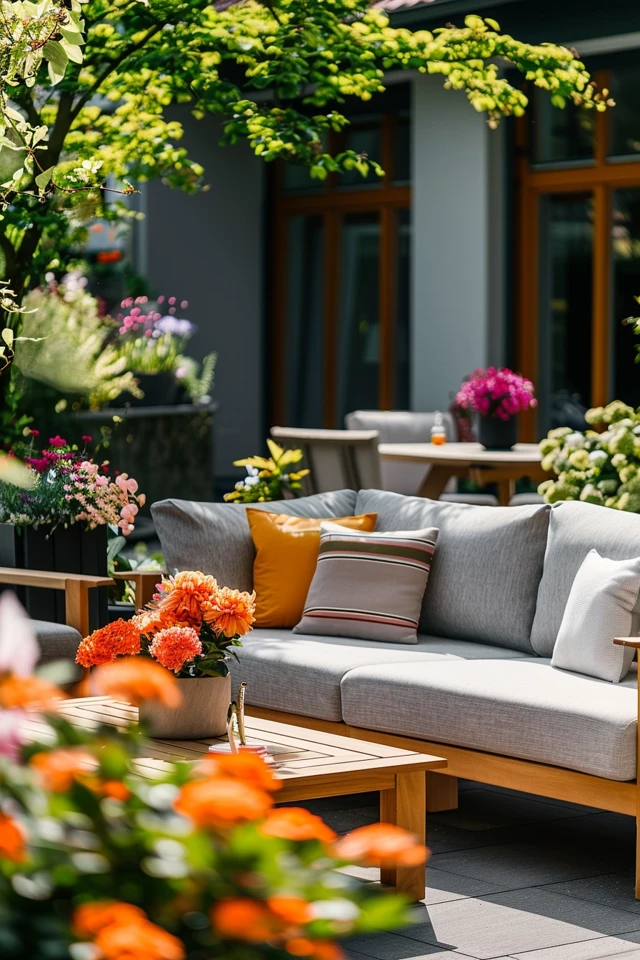One of the most common concerns for outdoor furniture owners is the growth of mold and mildew, especially on upholstered cushions and pillows. Most manufacturers do not cover mold or mildew problems in their warranties or protection plans, so it is up to the buyer to prevent these issues. Moisture is the main enemy when it comes to mold and mildew growth, so it is essential to choose the right fabric for outdoor furniture upholstery. Fabrics like acrylic and olefin are water-resistant and mildew-resistant, making them ideal choices. Regular cleaning and maintenance, as well as proper storage, are also important steps in preventing mold on outdoor furniture.
Key Takeaways:
- Choose water-resistant and mildew-resistant fabrics like acrylic and olefin for outdoor furniture upholstery.
- Regular cleaning and maintenance are essential to prevent mold growth on outdoor furniture.
- Proper storage in a dry place, using waterproof containers, is crucial to protect outdoor furniture from mold.
- Moisture is the main enemy when it comes to mold and mildew growth on outdoor furniture.
- Select fabrics specifically engineered for outdoor use to ensure longevity and cleanliness.
Choosing Mold-Resistant Fabrics for Outdoor Cushions
The first step in preventing mold on outdoor cushions is selecting mold-resistant fabrics. When it comes to outdoor cushion fabrics, it’s crucial to choose materials that are designed to withstand the elements and resist mold and mildew. Two popular options are acrylic and olefin fabrics.
Acrylic fabrics are known for their water-resistant properties, making them an excellent choice for outdoor upholstery. Additionally, they are mildew-resistant, ensuring that your cushions stay clean and fresh even in damp environments.
Olefin fabrics, on the other hand, are highly resistant to water and mold. These fabrics, such as Nuvella, Sunbrella, and CushionGuard, are specifically engineered for outdoor use, offering superior protection against moisture and mold growth.

When selecting mold-resistant fabrics, consider opting for materials with tight weaves. Fabrics that have closely knit fibers further prevent moisture penetration, reducing the risk of mold formation.
“Choosing the right fabric for outdoor cushions is essential for preventing mold and mildew. Acrylic and olefin fabrics, like Nuvella, Sunbrella, and CushionGuard, offer excellent resistance to water and mold, ensuring the longevity of your cushions.”
By using mold-resistant fabrics for your outdoor cushions, you can enjoy a worry-free outdoor experience. These fabrics not only provide protection against mold and mildew but also offer durability and easy maintenance, making them ideal choices for outdoor furniture upholstery.

Regular Cleaning and Proper Storage for Outdoor Cushions
Regular cleaning and proper storage are essential for maintaining the longevity and cleanliness of your outdoor cushions. To prevent mold and mildew growth, it is crucial to take proactive steps in outdoor cushion maintenance.
When it comes to regular cushion cleaning, different fabric types may require specific care instructions. However, a general rule of thumb is to clean outdoor cushions at least 2 to 4 times per year. You can use home-based cleaning solutions like vinegar, dish soap, borax, or baking soda to clean most fabrics. However, be sure to test these solutions in an inconspicuous area first to ensure they do not cause any discoloration or damage.
Proper storage techniques play a vital role in protecting your cushions from moisture and mold. Storing cushions in a dry place, such as a shed or garage, can help prevent excessive moisture accumulation. Additionally, using waterproof storage containers or plastic bags can provide an extra layer of protection against dampness and mold growth during storage periods.
By incorporating regular cleaning and proper storage practices into your outdoor cushion care routine, you can significantly reduce the risk of mold and mildew, ensuring your cushions stay fresh and comfortable for years to come.


